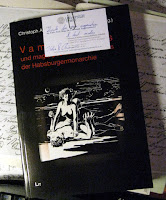 |
| Bram Stoker |
The 100th anniversary of Bram Stoker's death is being commemorated by a series of conferences and publications across the globe. Not only is the subsequent output a boon for Dracula scholars, but vampire enthusiasts will reap the benefits, too! With all due respect to Mr. Stoker. Ahem.
One standout, in my opinion, is a conference that'll be conducted by the Trinity College Dublin's School of Languages, Literatures and Cultural Studies on April 20th—the date of Stoker's passing. It's called, 'Vampire (&) science: a trans-disciplinary conference'. While I'm only familiar with a few of the participants—Clemens Ruthner, Christian Reiter and David J. Skal—it's the essay topics that've really got me hooked. Take a look at the list!
I'd name a few of particular interest, but they all sound fantastic! I'd end up reproducing the whole thing. If you happen to be in the area, note attendance is free. Yes, free.
My first thought on viewing the line-up—well, after my initial excitement—was: are they going to be published? I contacted the event's organiser, Clemens Ruthner, and asked, 'This may be premature, but could you tell me whether a book will result from the papers, a la Vampirismus und magia posthuma (2011). The papers sound fascinating. It'd be such a shame if they weren't published.'1
Ruthner replied, mentioning that he'd 'try to get the papers published at a good academic press.'2 Hell yes! I then offered my assistance, should he require it.3 I wasn't talking out of my ass, either.
A while ago, John W. Morehead—of TheoFantastique fame—forwarded me a link to his Kickstarter project, The undead and theology. Once I'd familiarised myself with its intended contents, etc, I promised to provide the remaining 'assistance' necessary by the required due date. And I did. As a result, the book will see publication. That's how much I care about this stuff, folks. Mind you, it was making pretty good headway without my help. So clearly, there's still a market for this stuff.
Now scroll through the Trinity College Dublin papers again. Who wouldn't want to read those? What publisher wouldn't want a piece o' that! Seriously. Bring it on. I wouldn't care if they were handwritten on foolscap, I'd still buy it. Publishers, if you're looking for something to print, keep your eyes on the Trinity College Dublin conference!
If you can't, somehow, bring yourself to publish that delectable selection, I'm sure we could raise a few pennies passing the hat around Kickstarter...
1. A Hogg, email, Thursday, 5 April 2012 8:17:07 PM↩
2. C Ruthner, email, Thursday, 5 April 2012 11:38:37 PM.↩
3. A Hogg, email, Friday, 6 April 2012 1:35:07 PM.↩




